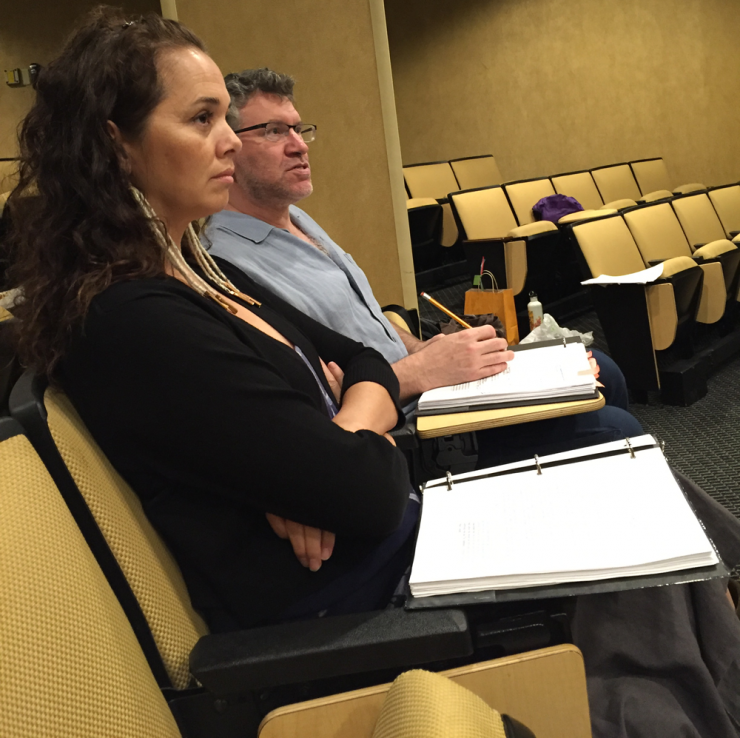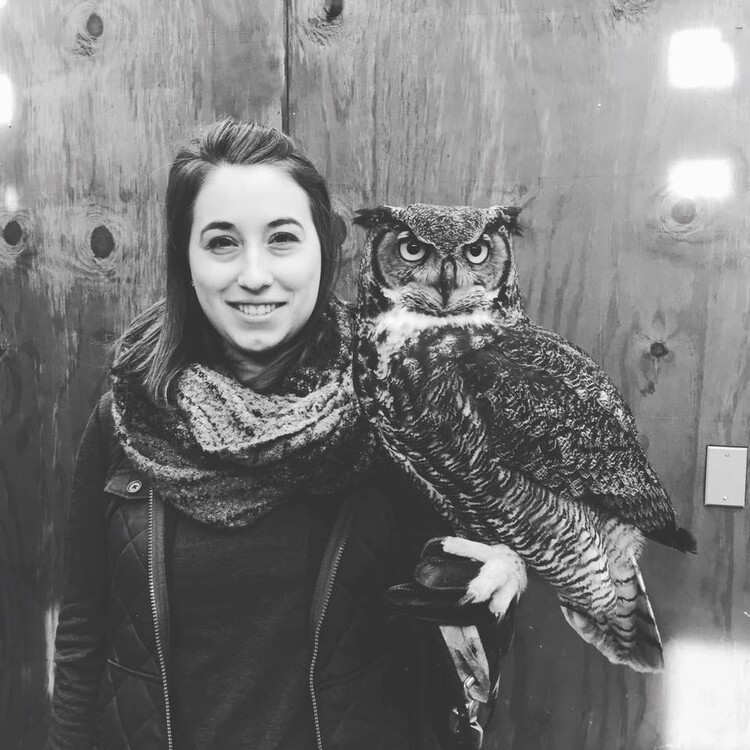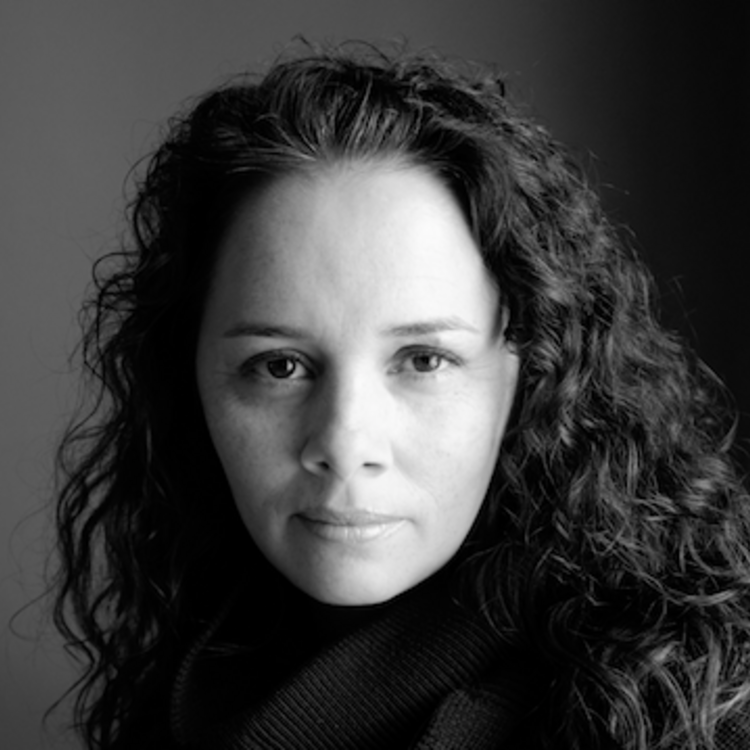The Thanksgiving Play
an interview with playwright Larissa FastHorse
Larissa FastHorse is an award-winning playwright, director, choreographer, and performer based in Santa Monica, California. Larissa is the recipient of numerous awards, grants, and fellowship, including a recent Pen Center Literary Award for Drama for her play Landless. As a playwright-activist and an enrolled member of the Rosebud Sioux Tribe, Sicangu Lakota Nation, her work has been at the forefront of bringing Indigenous stories to the stage.
Her latest play, The Thanksgiving Play, is currently in development with a number of theatre companies including, recently, Baltimore Center Stage’s Play Lab where this interview took place.
I really believe that if your theatre company…is not in some way engaging with Indigenous peoples, either as art, artists, or communities, you’re morally wrong. You’re standing on their land, you’ve built your theatre on their land, you are benefitting from stolen privilege. As far as I know, there are very few theatre companies that have even tried to acknowledge that and pay it back in some way. But it’s not too late.
Deanie Vallone: Though The Thanksgiving Play has very “American” roots, you actually wrote it while in Ireland. Can you talk about the process of writing this piece through the Joe Dowling Annaghmakerrig Fellowship from the Guthrie?
Larissa FastHorse: I was at the Tyrone Guthrie artist retreat in Ireland and I had two weeks to write a new play about anything I wanted. As a Native American female writer I am inherently political by my very existence as a member of a sovereign nation within a conquering nation and by being female in a patriarchal society. So I do like to tackle those themes and issues that I’m dealing with and that I’m seeing in my life; but I also like to tackle them in ways that are not just theatrical, but also broadly acceptable and palatable.
I did a ton of research before I got to Ireland, especially on the history of Thanksgiving. It’s such a charged holiday, and I think most people aren’t aware how charged it is for Indigenous people in this country. It’s the first time I’ve tackled a really specific historical issue that everybody knows about, or they believe they know about. So I’ve got this American history play, in a contemporary setting. But then I get to Ireland and suddenly I’ve got all these Irish voices in my head, everybody’s speaking in Irish accents. I was the only American there in this estate full of artists.
As I got to know these artists, I learned that several of them are traditionally Irish, original Irish people, and they’re very involved in their language and their culture and helping it be brought—correctly—back into contemporary culture. And I realized that there are many parallels with Indigenous people on this continent. Of course, because we’re all humans; we’re all dealing with the same planet. There are so many parallels in our cultures and our relationships with the land, and the way we use the land, and the way we celebrated the land and harvests. Additionally, they’re fighting a lot of the same things we are: their existence had been nearly erased by colonization and now, as it’s being revitalized in the mainstream culture, it is often done through a colonial viewpoint, so it’s from an outsider point of view. That’s sometimes just really wrong and sometimes so well-meaning, but it’s still wrong because people are afraid to ask; they’re afraid to make mistakes, they’re afraid to say the wrong thing. So, rather than going to the source and saying, “Hey, I’m a complete idiot, help us do this right,” they kind of fumble forward or do nothing. And those are two things we deal with here in the United States all the time as Indigenous people.
Unfortunately, more and more in my career, I see theatres—well–meaning, great people—choose to do nothing rather than make a mistake. That’s really scary and upsetting to me.
Deanie: How have varied audiences reacted and related to the play so far?
Larissa: Originally it was all set in Los Angeles, so the first reading at [UC] Berkeley was of course very applicable to that audience. The characters were all LA actors. After we read it in Oregon at Artists Rep—which wasn’t a public reading, it was just a theatre staff reading—we realized it was letting the audience off the hook to make it LA actors, because they can all laugh and say, “Well, that’s Los Angeles, they’re crazy anyway, that’s not us.” That was a change I made coming to Baltimore, to take it out of Los Angeles. What’s cool is how much people are relating to it, even if they’re not in the world of hyper-sensitive PC correctness. They’ve heard these things, they are getting the concepts and getting the feelings and getting the parts that are a little broader, a little more general. Truly though, people in Oregon and Berkeley and Baltimore are all saying, “We have these friends,” or “I am these people.” That’s part of the goal, to make sure that everybody can see themselves in some way. I want to be sure people aren’t armoring themselves against characters they don’t understand or don’t see themselves as or don’t want to see themselves as.
Deanie: This play features primarily white actors—or POC passing as white, as noted in the casting. As someone who aims to bring Indigenous issues to light and provide roles for Indigenous actors, how have you negotiated this artistic choice?
Larissa: I’m conflicted about it. I would much rather be able to write plays with Indigenous characters and have them be produced, but that’s not American theatre right now.
I’m really fortunate that a lot of theatres commission me to write plays and they produce my plays, which is awesome. I’m really grateful I have a career as a playwright and a choreographer in this field. But the problem I have again and again is that my plays, after they’re produced once, don’t get additional productions. The number one reason I hear is because of casting; theatres claim they don’t know any Indigenous actors or they cannot afford to bring in Indigenous actors. I believe that America is not done needing to hear about Indigenous issues and stories, but I didn’t want to continue to fight; so I said, fine, I have two weeks of my fellowship, I’m going to write a play straight through that is entirely about Native American issues that does not necessarily use Native Americans. That’s the challenge I put out for myself. Fortunately, I really like the play that resulted.
I won’t stop, of course, writing plays with strong Indigenous characters; I have other plays that I continue to work on and commissions with Indigenous people. When I get a commission, the first thing I do is say, “Whose people were originally on this land?” To the theatre I say, “Let’s talk about those people. What do you know about them? Have you engaged with that community? Do you know that community?” And so of course I would much rather be able to write whatever I want, but that’s not the reality of American theatre. But I’m half white; I should be able to write about white people. So I’m honoring my white half for the first time.
But I really do believe it’s important, as an artist, to be able to tell stories in whatever way I need to. The truth is, it’s amazing how many people have already said, “Oh, we can do this play, let’s talk.” It’s exciting and so great, but I wish they felt the same way about my plays with Indigenous characters. So I figure, well, at least they have a Native American playwright, and I get in the door and can keep that door open and either propose further projects or bring in other writers—there are so many amazing Indigenous playwrights in this country. Something I do as a playwright with every theatre I work with, no matter what the play, is work with the theatre company to do outreach within their community, get to know the Indigenous community within their area, find ways to be of service to that community on whose land they built a big theatre. This comes out as a hundred different things—sometimes it’s having Indigenous artists working in the lobby, or art displays, or scholarships for kids for theatre programs, or readings for other Indigenous artists, dinners, hiring Indigenous people, putting them on their board. We’ve done a lot of things at different theatres; it’s pretty awesome. I can’t do that, though, unless I’m working with the theatre.

Deanie: You mentioned in a Play Lab talkback that your plays are meant to provoke questions, not necessarily answer them. Are there any specific questions that you are hoping The Thanksgiving Play will ask or that people will be asking themselves when they leave the theatre?
Larissa: To me, the second acts of my plays happen after the shows. They happen, not even in the talkback, but on the drive home, in a bar, the next morning. If I do my job as I’ve defined it, that’s what’s happening: there are discussions happening a day later. People are trying to sort things out. Not because they have no idea what happened, that it is so confusing; but because they know something happened, they had a visceral experience and they believe it may or may not pertain to them, or there may or may not be something they need to do about it. For me, that’s the ultimate goal for what I want to do as a theatre activist. I very much write psychologically. I write to get into people’s heads and make the change happen not necessarily onstage but later, in their brains. That’s why I write a lot of hyper-realism. I make sure people connect one-on-one with these characters and take them home with them.
Deanie: What can we, as theatre artists, be doing better to address the lack of Indigenous voices on and off stage?
Larissa: First off, I love theatre. This is what I do. Theatre has been so good to me. I’m so grateful that there are tons of funders and theatre companies and artists who really want to engage in the kind of work I do and engage in the stories I enjoy telling.
That said, there is certainly more to be done. I really believe that if your theatre company—let’s start with that first but I think this trickles down to individual artists as well—is not in some way engaging with Indigenous peoples, either as art, artists, or communities, you’re morally wrong. You’re standing on their land, you’ve built your theatre on their land, you are benefitting from stolen privilege. As far as I know, there are very few theatre companies that have even tried to acknowledge that and pay it back in some way. But it’s not too late. It really isn’t. It’s not too late to include these stories, audiences, and artists. It’s not too late to find a way to be of service—that’s the goal. Not to be patronizing but to be of service, as one should be to the host in whose home you are standing. We offer to wash the dishes if we’re staying in someone’s home, or bring a gift, because we’re grateful. And I think that gratitude is not being shown and unfortunately I think that mostly—because I’m an optimistic person—it’s not being shown because of fear. Fear of doing the wrong thing, of offending somebody, of not doing something right.
And that’s the next thing American theatre has to do: make a mistake. Just screw up. That was the best gift I got from my first play, Average Family, which was with Peter Brosius [Artistic Director at Children’s Theatre Company in Minneapolis]. He said, “Look, I’m going to screw up a lot. I’m going to say the wrong thing. I’m going to unintentionally be offensive. I need to say I’m going to do that and then I need you to help me learn.” And I said, “Yes, I can do that.” And together we made this amazing, beautiful play that brought together hundreds of members of the community and all these artists and all these Indigenous actors. It was a really wonderful experience, but it couldn’t have happened if Peter wasn’t willing to screw up and be wrong. If we make a mistake then we have to go out and talk to Indigenous people and bring them in, or go to them and find out what can we do different, and then do better on the next one. Don’t give up. And until theatres, artists, everybody decides to do that, we’re not going to get anywhere.
Americans, as people, are desperate for this knowledge of Indigenous people, for this history, for some understanding, for some knowledge of how not to make as many mistakes. They’re desperate for that and there’s nowhere else to get it. We don’t get it in school. Everything you look up online is written from an outsider point of view. There are just so few resources—often people don’t even know where Indigenous people physically are because we’ve been shoved off into little reservations in the middle of nowhere. People want access to our Indigenous world and our culture and our community. Many times our art is the only way they can get it.
Larissa and Ty Defoe’s consulting company, Indigenous Direction, and the group Native Voices at the Autry are available as resources to help bring Indigenous voices, stories, and artists into your theatre.



Comments
The article is just the start of the conversation—we want to know what you think about this subject, too! HowlRound is a space for knowledge-sharing, and we welcome spirited, thoughtful, and on-topic dialogue. Find our full comments policy here
So happy for you Larissa!
I hope that someday someone (ideally someone who is currently there, and is NOT a white-male [like me]) writes a play about how and why our CURRENT federal government -- despite being led by a non-white president -- refuses to protect the indigenous water-protectors (protesters) at Standing Rock (even on Thanksgiving!) from the brutal violent treatment of the local government forces.
Thanks for the shout out Larissa and Ty - hope your Thanksgiving if bright
How ironic and appropriate that I'm reading this on Thanksgiving day. Very appreciative of it's information, perspective, teaching, and offering. And I do see it as an offering to the larger theatrical community to inspire future engagement of these issues and themes in their respective communities. The importance of 'being of service' (from my occasional engagement with indigenous peoples), is deeply understood by this culture.. I like to think that as cultural awareness continues to be confronted with the necessity of removing personal and socially conditioned blinders to truly look at the cultural, racial, religious, gender, sexual and political constructs that continue to promote division, judgment, self-righteousness, entitlement etc, that it will also open its consciousness to explore the deep and feared wound of our treatment of the indigenous peoples of this land. I agree that much of the aversion of any such engagement is based on a deep discomfort and fear present in the subconscious, like a hidden virus in the blood. I also think entwined with this is a very large weight of guilt. Nonetheless, it is only by not closing our eyes to the infection, but looking at it, recognizing what it is, taking action to cleanse and treat it, that it will not develop into gangrene and amputation. May the path of healing be welcomed and evoked to move us beyond our fears.